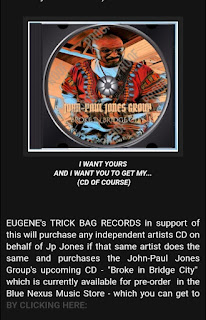CULTURAL PRESERVATION VS. CASH PROFITEERING
UPDATE 11/13/2020:
Many of us have been in a music appreciation course. However, we know that Jp has appreciated music for longer than he could speak, write or walk (according to his family). Using conventional research, we came up with these definitions of music genre.
We previously had an interesting conversation with a journalist/editor about music and what is and isnt a particular form of music and who should or shouldnt be included in a particular sub-culture of American Society.
If you read this post we at the John-Paul Jones Group thank you. We copied all of these definitions from readily available sources of informaton on the internet.
When reading...ask yourself....
what is the common cultural denominator in all of these genres of music?
And who should be developing the definition?
Creators, Listeners or the Gatekeepers?
Because when it comes to music... it seems like the gatekeepers (media, promoters, record labels) have felt they know whats best... but only in regards to profits. And in having this one dimensional view perpetuate willfull negligence and exclusion of cultural legacy and ethnic ancestry.
Here are some genres...
BLUES: melancholic music of Black American folk origin, typically in a twelve-bar sequence. It developed in the rural southern US toward the end of the 19th century, finding a wider audience in the 1940s, as black people migrated to the cities. This urban blues gave rise to rhythm and blues and rock and roll.
RHYTHM AND BLUES: Blues is a music genre and musical form which was originated in the Deep South of the United States around the 1860s by African- (Black) Americans from roots in African musical traditions, African-American (Black American) work (slave) songs, and spirituals.
ROCK AND ROLL: a type of popular dance music originating in the 1950s, characterized by a heavy beat and simple melodies. Rock and roll was an amalgam of Black American rhythm and blues and white country music, usually based on a twelve-bar structure and an instrumentation of guitar, bass, and drums.
COUNTRY MUSIC: a form of popular music originating in the rural southern US. It is traditionally a mixture of ballads and dance tunes played characteristically on fiddle, guitar, steel guitar, drums, and keyboard. Historians acknowledge that country music is derived from a melting pot of cultures. Mountain or hillbilly music, in particular, combines the ballads and folksongs brought to the South by immigrants from the British Isles in the 18th and 19th Centuries and the rhythmic influences of African (Black) immigrants (slaves).
BLUES ROCK: is a fusion genre combining elements of blues and rock and roll. It is mostly an electric ensemble-style music with instrumentation similar to electric blues and rock: electric guitar, electric bass guitar, and drums, sometimes with keyboards and harmonica. From its beginnings in the early to mid-1960s, blues rock has gone through several stylistic shifts and along the way it inspired and influenced hard rock, Southern rock, and early heavy metal. Blues rock continues to be an influence in the 2020s, with performances and recordings by popular artists.
JAZZ: a type of music of Black American origin characterized by improvisation, syncopation, and usually a regular or forceful rhythm, emerging at the beginning of the 20th century. Brass and woodwind instruments and piano are particularly associated with jazz, although guitar and occasionally violin are also used; styles include Dixieland, swing, bebop, and free jazz.
QUESTION: Why have the histories of blues, jazz, country, rock and roll, and blues rock often been treated as distinct?
THOUGHT: Ethnic segregation was/is prominent in the U.S. social, econimic, political, legal and cultural intra-relationships.
OPINION: Genre Purist who choose not to understand that all of these music forms are by-products of the culture of a PEOPLE
Those who ignore/dismiss the current day explorations and contributions of the descendants of those same PEOPLE...
Are actually perpetuating social/ethnic segregation and economic exclusion within an artistic & cultural phenomena inheritently belonging to the legacy of a particular ethnic group of American people.
This does not mean no one else (from a different ethnic background) can enjoy it, make it, or play it.
It does however mean that connections through blood tears death and family ancestry mean something and should never be forgotten or dismissed in favor of popularity and/or profit.
If in fact said persons preach preserving and promoting cultural history in regards to one music genre or another. INCLUSION is very much vital to CULTURAL PRESERVATION.
Do Not Forget The BEST was to contribute to preserving the culture is to support those artist who are currently creating and developing new art within it. With that being said... why not pre-order the John-Paul Jones Group album... "Broke In Bridge City" TODAY at https://www.johnpauljonesgroup.com/music.html




Comments
Post a Comment
Thanks for commenting. Your support is appreciated. Please subscribe to the blog.